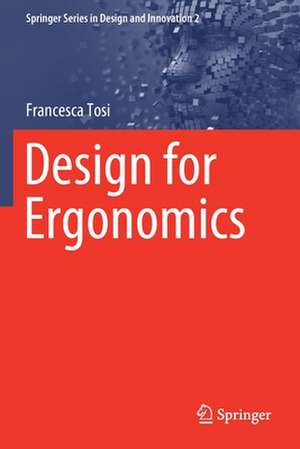Design for Ergonomics: Springer Series in Design and Innovation, cartea 2
Autor Francesca Tosien Limba Engleză Paperback – 29 noi 2020
| Toate formatele și edițiile | Preț | Express |
|---|---|---|
| Paperback (1) | 394.24 lei 6-8 săpt. | |
| Springer International Publishing – 29 noi 2020 | 394.24 lei 6-8 săpt. | |
| Hardback (1) | 542.99 lei 6-8 săpt. | |
| Springer International Publishing – 29 noi 2019 | 542.99 lei 6-8 săpt. |
Din seria Springer Series in Design and Innovation
- 18%
 Preț: 1406.20 lei
Preț: 1406.20 lei - 18%
 Preț: 1012.08 lei
Preț: 1012.08 lei - 18%
 Preț: 1444.55 lei
Preț: 1444.55 lei - 18%
 Preț: 950.21 lei
Preț: 950.21 lei -
 Preț: 417.68 lei
Preț: 417.68 lei -
 Preț: 450.33 lei
Preț: 450.33 lei - 18%
 Preț: 1396.08 lei
Preț: 1396.08 lei - 18%
 Preț: 950.96 lei
Preț: 950.96 lei - 24%
 Preț: 707.54 lei
Preț: 707.54 lei -
 Preț: 263.28 lei
Preț: 263.28 lei - 18%
 Preț: 950.33 lei
Preț: 950.33 lei - 18%
 Preț: 1228.29 lei
Preț: 1228.29 lei - 15%
 Preț: 690.76 lei
Preț: 690.76 lei - 18%
 Preț: 1400.06 lei
Preț: 1400.06 lei - 18%
 Preț: 942.63 lei
Preț: 942.63 lei - 18%
 Preț: 1550.30 lei
Preț: 1550.30 lei - 15%
 Preț: 646.62 lei
Preț: 646.62 lei - 18%
 Preț: 1409.21 lei
Preț: 1409.21 lei - 18%
 Preț: 887.55 lei
Preț: 887.55 lei - 18%
 Preț: 1219.16 lei
Preț: 1219.16 lei - 18%
 Preț: 898.58 lei
Preț: 898.58 lei - 15%
 Preț: 637.28 lei
Preț: 637.28 lei - 20%
 Preț: 1281.49 lei
Preț: 1281.49 lei - 24%
 Preț: 1048.93 lei
Preț: 1048.93 lei - 18%
 Preț: 791.71 lei
Preț: 791.71 lei - 18%
 Preț: 791.71 lei
Preț: 791.71 lei
Preț: 394.24 lei
Preț vechi: 492.81 lei
-20% Nou
Puncte Express: 591
Preț estimativ în valută:
75.46€ • 81.100$ • 63.43£
75.46€ • 81.100$ • 63.43£
Carte tipărită la comandă
Livrare economică 21 aprilie-05 mai
Preluare comenzi: 021 569.72.76
Specificații
ISBN-13: 9783030335649
ISBN-10: 303033564X
Pagini: 370
Ilustrații: XXVI, 370 p.
Dimensiuni: 155 x 235 mm
Greutate: 0.55 kg
Ediția:1st ed. 2020
Editura: Springer International Publishing
Colecția Springer
Seria Springer Series in Design and Innovation
Locul publicării:Cham, Switzerland
ISBN-10: 303033564X
Pagini: 370
Ilustrații: XXVI, 370 p.
Dimensiuni: 155 x 235 mm
Greutate: 0.55 kg
Ediția:1st ed. 2020
Editura: Springer International Publishing
Colecția Springer
Seria Springer Series in Design and Innovation
Locul publicării:Cham, Switzerland
Cuprins
ERGONOMICS & DESIGN – DESIGN FOR ERGONOMICS.- THE COMPONENTS OF INTERACTION BETWEEN PEOPLE AND SYSTEMS.- PROJECT PROBLEMS AND INTERVENTION CRITERIA.
Notă biografică
Francesca Tosi is professor of Industrial Design at University of Florence, Italy, where she leads the Laboratory of Ergonomics & Design (LED). Her research interests focus on Product and Interior Design, Ergonomics in Design, Design for All, daily use products and environments, and products and services for health and care. She was president of the Italian Society of Ergonomics and Human Factors (SIE) from 2010 to 2018, and currently serves as president of the Italian Design Conference (CUID).
Textul de pe ultima copertă
This book focuses on the global quality of the design of systems that people interact with during their work activities and daily lives; a quality that involves the globality of people’s experience – physical, sensory, cognitive and emotional. It presents a concise and structured overview of the ergonomic approach to planning, and of methodological and operational tools from ergonomic research that can more directly and concretely contribute to the design process. The book also explores physical ergonomics and cognitive ergonomics, which are essential components of design culture. The final section addresses the main design problems and intervention criteria regarding the design of environments, products and equipment, as well as the design of communication, training and learning interface systems based on digital technologies. The book is chiefly intended for designers and anyone interested in the methods, tools and opportunities for in-depth analysis and development that ergonomics can offer regarding the conception, production and testing of products, environments and services, whether physical or virtual. It also offers a learning resource for professionals and students in Industrial Design and Planning.
Caracteristici
Includes an appendix dedicated to case studies and to the application of the “design path” to the content and methods covered in the volume Combines two cognitive levels – assessment methods and basic interdisciplinary knowledge – which constitute the methodological and operational tools that guide the entire product development process Serves as an ideal learning resource for professionals and students in Industrial Design and Planning
